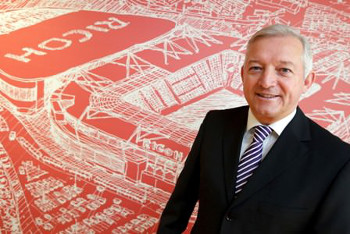Ireland’s workforce set for era of drones,
carrier nodes and hologram business meetings.
 Gary Hopwood general manager Ricoh IrelandAccording to a new study commissioned by Ricoh, workplaces in Ireland could be transformed within the next two decades by technology and processes that do not even exist today. The survey reveals some interesting insights into how employees believe the use of new technologies will enhance and simplify interaction with colleagues and information.
Gary Hopwood general manager Ricoh IrelandAccording to a new study commissioned by Ricoh, workplaces in Ireland could be transformed within the next two decades by technology and processes that do not even exist today. The survey reveals some interesting insights into how employees believe the use of new technologies will enhance and simplify interaction with colleagues and information.
More than 700 employees from Ireland and the UK were surveyed by Coleman Parkes Research and many showed strong foresight when considering innovations set to arrive.
Some of the predictions in the report are the stuff of Jules Verne’s, but not too long ago, using your mobile phone to print or access information on the move seemed farfetched as well.
Employees forecast that within the next 20 years they will be able to send virtual assistants or holograms (59 per cent) to attend meetings on their behalf. When they were pressed to think even more daringly, they consider the next batch of innovations will include drones; Bluetooth from brain-to-brain; and carrier nodes which are small devices fitted to the ear that allow audio and video data to be transmitted directly to the brain as electronic signals.
And their imagination didn’t stop just there.
Other innovations that employees expect to have readily available within the next decade include touch-based interactive devices (69 per cent), augmented reality glasses (56 per cent) and the ability to perform all tasks by voice recognition (56 per cent).
The report highlighted however, that despite the widespread excitement and value placed in a tech evolved workplace, less than a third of employees (29 per cent) say their company shows any strong appetite for creating new ways of working and deploying technologies to make this future a reality.
Gary Hopwood, general manager, Ricoh Ireland said: “We carried out this survey because we wanted to know how people want to work and what’s important to them going forward. The Irish workforce appears to have a great appetite for new technologies that can improve their productivity and the way they work. Irish organisations that do not act today to build a more digital, agile workplace will struggle to compete in the future. This heightens the need for organisations to review and adapt their ways of working, and putting themselves in the best position to benefit from future digital innovations.”
For further information, please visit www.ricoh.ie











